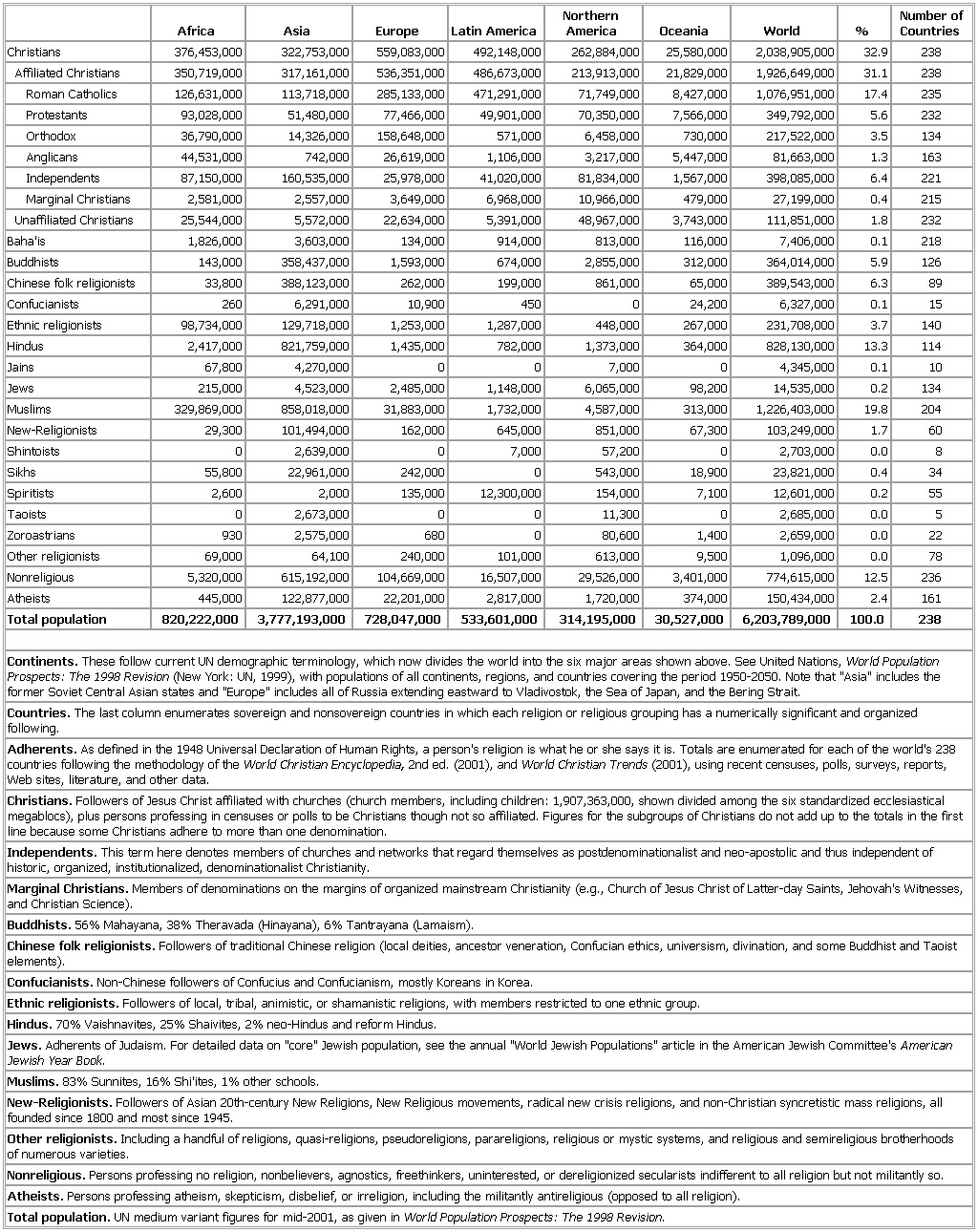- Worldwide Adherents of All Religions by Six Continental Areas, Mid-2002
-
▪ TableCountriesChristians 376,453,000 322,753,000 559,083,000 492,148,000 262,884,000 25,580,000 2,038,905,000 32.9 238Affiliated Christians 350,719,000 317,161,000 536,351,000 486,673,000 213,913,000 21,829,000 1,926,649,000 31.1 238Roman Catholics 126,631,000 113,718,000 285,133,000 471,291,000 71,749,000 8,427,000 1,076,951,000 17.4 235Protestants 93,028,000 51,480,000 77,466,000 49,901,000 70,350,000 7,566,000 349,792,000 5.6 232Orthodox 36,790,000 14,326,000 158,648,000 571,000 6,458,000 730,000 217,522,000 3.5 134Anglicans 44,531,000 742,000 26,619,000 1,106,000 3,217,000 5,447,000 81,663,000 1.3 163Independents 87,150,000 160,535,000 25,978,000 41,020,000 81,834,000 1,567,000 398,085,000 6.4 221Marginal Christians 2,581,000 2,557,000 3,649,000 6,968,000 10,966,000 479,000 27,199,000 0.4 215Unaffiliated Christians 25,544,000 5,572,000 22,634,000 5,391,000 48,967,000 3,743,000 111,851,000 1.8 232Baha'is 1,826,000 3,603,000 134,000 914,000 813,000 116,000 7,406,000 0.1 218Buddhists 143,000 358,437,000 1,593,000 674,000 2,855,000 312,000 364,014,000 5.9 126Chinese folk religionists 33,800 388,123,000 262,000 199,000 861,000 65,000 389,543,000 6.3 89Confucianists 260 6,291,000 10,900 450 0 24,200 6,327,000 0.1 15Ethnic religionists 98,734,000 129,718,000 1,253,000 1,287,000 448,000 267,000 231,708,000 3.7 140Hindus 2,417,000 821,759,000 1,435,000 782,000 1,373,000 364,000 828,130,000 13.3 114Jains 67,800 4,270,000 0 0 7,000 0 4,345,000 0.1 10Jews 215,000 4,523,000 2,485,000 1,148,000 6,065,000 98,200 14,535,000 0.2 134Muslims 329,869,000 858,018,000 31,883,000 1,732,000 4,587,000 313,000 1,226,403,000 19.8 204New-Religionists 29,300 101,494,000 162,000 645,000 851,000 67,300 103,249,000 1.7 60Shintoists 0 2,639,000 0 7,000 57,200 0 2,703,000 0.0 8Sikhs 55,800 22,961,000 242,000 0 543,000 18,900 23,821,000 0.4 34Spiritists 2,600 2,000 135,000 12,300,000 154,000 7,100 12,601,000 0.2 55Taoists 0 2,673,000 0 0 11,300 0 2,685,000 0.0 5Zoroastrians 930 2,575,000 680 0 80,600 1,400 2,659,000 0.0 22Other religionists 69,000 64,100 240,000 101,000 613,000 9,500 1,096,000 0.0 78Nonreligious 5,320,000 615,192,000 104,669,000 16,507,000 29,526,000 3,401,000 774,615,000 12.5 236Atheists 445,000 122,877,000 22,201,000 2,817,000 1,720,000 374,000 150,434,000 2.4 161Total population 820,222,000 3,777,193,000 728,047,000 533,601,000 314,195,000 30,527,000 6,203,789,000 100.0 238Continents. These follow current UN demographic terminology, which now divides the world into the six major areas shown above. See United Nations, World Population Prospects: The 1998 Revision (New York: UN, 1999), with populations of all continents, regions, and countries covering the period 1950-2050. Note that "Asia" includes the former Soviet Central Asian states and "Europe" includes all of Russia extending eastward to Vladivostok, the Sea of Japan, and the Bering Strait.Countries. The last column enumerates sovereign and nonsovereign countries in which each religion or religious grouping has a numerically significant and organized following.Adherents. As defined in the 1948 Universal Declaration of Human Rights, a person's religion is what he or she says it is. Totals are enumerated for each of the world's 238 countries following the methodology of the World Christian Encyclopedia, 2nd ed. (2001), and World Christian Trends (2001), using recent censuses, polls, surveys, reports, Web sites, literature, and other data.Christians. Followers of Jesus Christ affiliated with churches (church members, including children: 1,907,363,000, shown divided among the six standardized ecclesiastical megablocs), plus persons professing in censuses or polls to be Christians though not so affiliated. Figures for the subgroups of Christians do not add up to the totals in the first line because some Christians adhere to more than one denomination.Independents. This term here denotes members of churches and networks that regard themselves as postdenominationalist and neo-apostolic and thus independent of historic, organized, institutionalized, denominationalist Christianity.Marginal Christians. Members of denominations on the margins of organized mainstream Christianity (e.g., Church of Jesus Christ of Latter-day Saints, Jehovah's Witnesses, and Christian Science).Chinese folk religionists. Followers of traditional Chinese religion (local deities, ancestor veneration, Confucian ethics, universism, divination, and some Buddhist and Taoist elements).Confucianists. Non-Chinese followers of Confucius and Confucianism, mostly Koreans in Korea.Ethnic religionists. Followers of local, tribal, animistic, or shamanistic religions, with members restricted to one ethnic group.Jews. Adherents of Judaism. For detailed data on "core" Jewish population, see the annual "World Jewish Populations" article in the American Jewish Committee's American Jewish Year Book.Muslims. 83% Sunnites, 16% Shi'ites, 1% other schools.New-Religionists. Followers of Asian 20th-century New Religions, New Religious movements, radical new crisis religions, and non-Christian syncretistic mass religions, all founded since 1800 and most since 1945.Other religionists. Including a handful of religions, quasi-religions, pseudoreligions, parareligions, religious or mystic systems, and religious and semireligious brotherhoods of numerous varieties.Nonreligious. Persons professing no religion, nonbelievers, agnostics, freethinkers, uninterested, or dereligionized secularists indifferent to all religion but not militantly so.Atheists. Persons professing atheism, skepticism, disbelief, or irreligion, including the militantly antireligious (opposed to all religion).Total population. UN medium variant figures for mid-2001, as given in World Population Prospects: The 1998 Revision.See as table:

* * *
Universalium. 2010.
